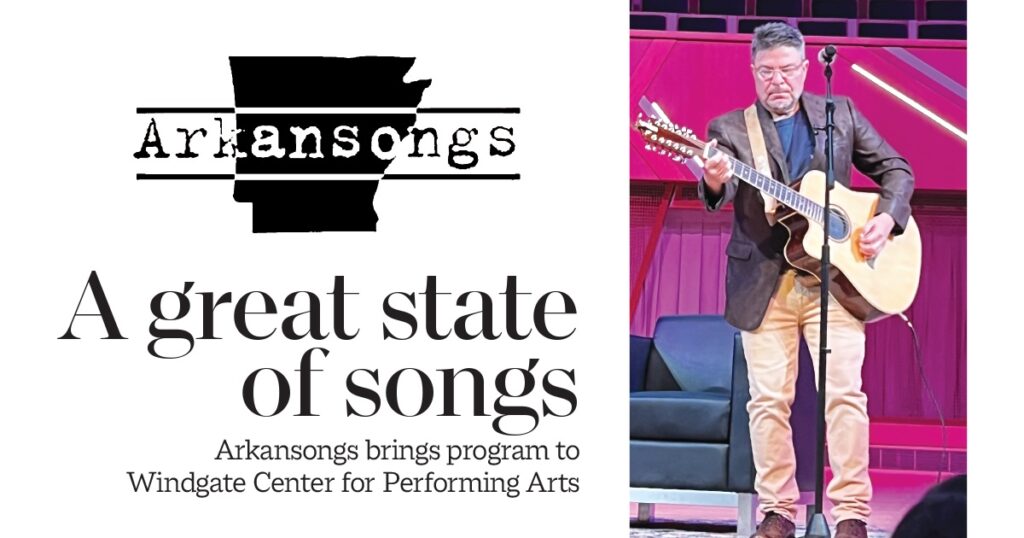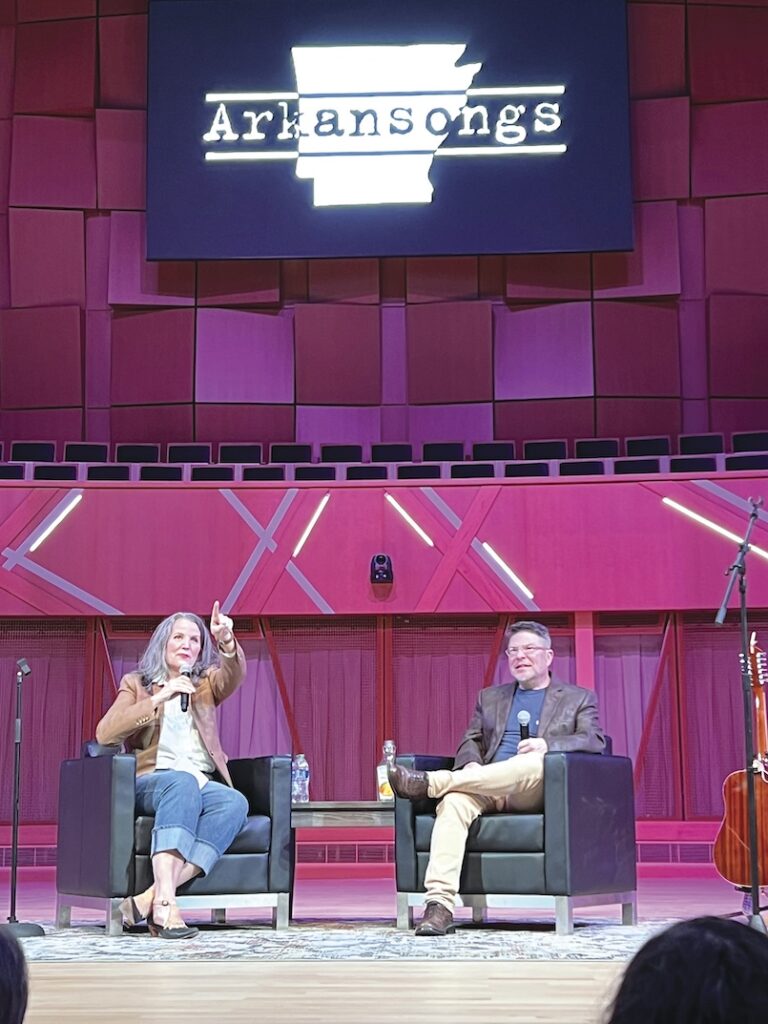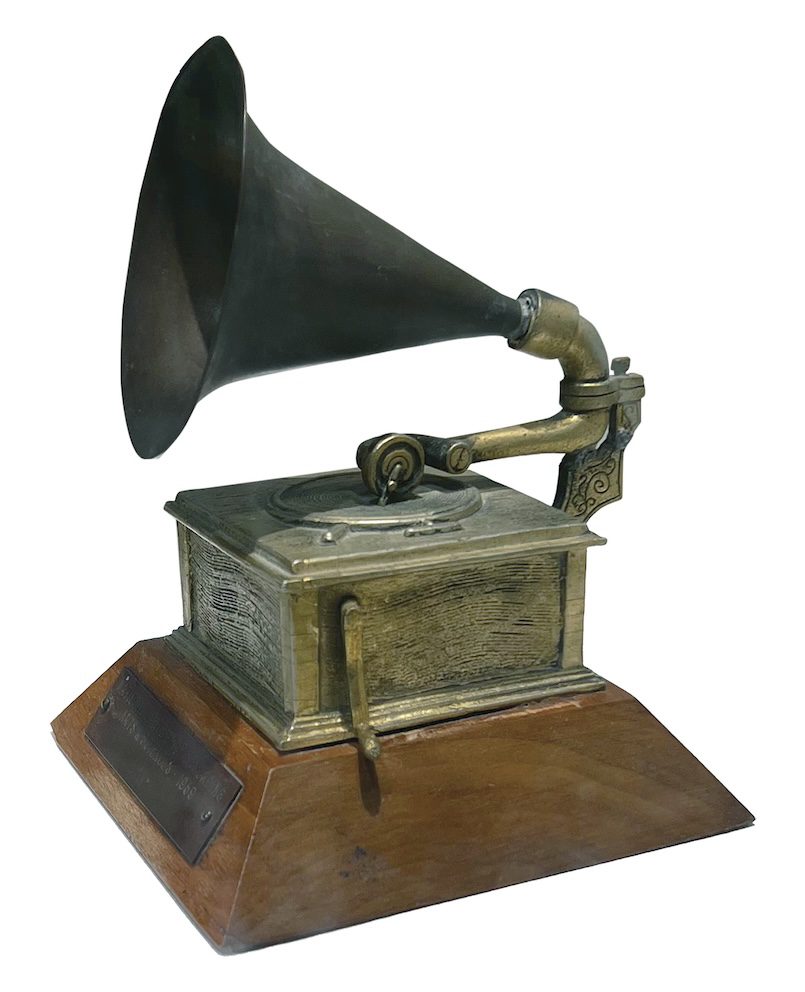31 Mar 2024 Arkansongs brings program to Windgate Center for Performing Arts
By Donna Lampkin Stephens
More than 25 years ago, at least one person was skeptical about the depth of “Arkansongs,” then came an idea for a new syndicated radio program featuring the state’s musical heritage.

“Some smarty said, ‘Once you cover Johnny Cash and Glen Campbell, you’re done,’” program co-founder Stephen Koch remembered during a celebration of 25 years of “Arkansongs” at the University of Central Arkansas’s Windgate Center for Fine and Performing Arts in February. “After 25 years, all the low-hanging fruit is gone but there’s so much cool stuff still out there.”
According to a press release, “Arkansongs” highlights the legends as well as the forgotten heroes in every musical genre while also showcasing the state’s people and places. Certainly there have been the Cashes, Campbells and Conway Twittys, but there have also been so many others — Louis Jordan, Roosevelt Sitz, Sister Rosetta Tharp, Almeda Riddle, Jimmy Driftwood, Sippie Wallace, Ronnie Hawkins, Levon Helm, Jimmy McKissic, Henry Glover, Carolina Cotton and Black Oak Arkansas, among many more. “We’ve got so much great material and so many great artists,” Koch said. “Arkansas has shown the world how to rock.”
On the “Arkansongs” website are 186 archived shows, with who knows how many more to come. “Now that all the low-hanging fruit is gone, (the episodes) take a lot longer to be baked to perfection,” Koch said. “Back in the early days, I had to do 26 episodes a year, which was a lot. It’s crazy to me now. How did I ever come up with my information? But luckily the internet came along pretty quick.”
Koch and Keith Merckx, who met while they were students at Arkansas State University, co-founded the award-winning program in 1998. The show’s home is Red River Radio, a network of stations boasting one of the nation’s largest public radio coverage areas.

The program has a large cadre of passionate fans. “Listening to ‘Arkansongs’ on KUAR is like opening a treasure box every Friday morning,” said Patricia Poulter, UCA provost and executive vice president. “I always learn something new or find myself being reacquainted with an old friend. It has helped me appreciate the rich heritage of music in Arkansas, as well as develop a deeper understanding of the many ways Arkansans have influenced the national music scene for decades.”
Koch grew up in Stuttgart in a house of music. “My brother played, and I played drums and harmonica from a young age,” he remembered. “My dad was a former DJ and had a massive record collection. I’d pour through his collections. I also do illustration cartooning, and I loved the art of the albums and looking at the labels. It was a passport to an era I could not be a part of.”
His father had listened to music older than his own generation, and that’s how Koch got interested in Jordan. “I remember him bouncing me on his knees to ‘Beans and Corn Bread,’” he said. “I’m not sure if it’s one of those things you’ve been told about and think you remember, but I feel like I remember that.”
Levon Helm was a hero around the family home as well. “I knew there was something out there in terms of Arkansas music pretty much from birth,” he said.
After earning his degree, Koch worked in journalism around Arkansas for a while, then moved to Los Angeles, where he started doing research on Jordan at the UCLA Film Library. “In the pre-internet days, you had to go to the source,” he said, chuckling.
As a journalist, Helm was one of his first big interviews. “They say don’t meet your heroes, but Levon was a prince of a man,” he said. “We became real friends.”
As editor of the weekly Sherwood Voice, Koch wrote a series on Arkansas musicians. “It kept going on and on,” he said. “It ended up being an eight-part thing.” And thus he found his professional niche.
“This is something that deserves some sober introspection and study, and this is something that people need to know about,” he said. “Historically, even before statehood, there has been a lot of chuckling about Arkansas’s inferiority complex. These are good stories about Arkansas. That, to me, seemed important.
“I really try to do this show very respectfully and soberly, even if the music is crazy. I want to give this the academic sheen that it deserves because it hasn’t been studied like it has been in most surrounding states. They have done a much better job of preserving and respecting their musical heritage, and I want to give ours the respect it deserves.”
“Stephen Koch’s encyclopedic knowledge of Arkansas music and musicians, his skills as a performing musician, and his sharp journalistic storytelling chops combine to teach, entertain and pique our curiosity,” Poulter said.

Koch is the author of “Louis Jordan: Son of Arkansas, Father of R&B,” and has a new book out this spring, “From Almeda to Zilphia: Arkansas Women Who Transformed American Popular Song,” from Et Alia Press.
“I want the state to continue to promote Arkansas music in ways we haven’t yet,” he said. “I would love to take the Hot Springs Music Trail that we’re working on statewide. You could do one in Phillips County and stay busy for years.”










